I’ve been to Greece several times already, mostly visiting the islands. It’s a country I love and am hoping to further explore, especially as I still know so little about it. To remedy that a bit, I went in search for fun facts about Greece… and I found quite a few.
Fun facts about Greece
This post is part of a series of interesting facts posts I’m doing for every country I have articles about here on the blog. Given their nature, these posts are research-based and even though a lot of time has gone into them, it’s still possible a mistake has snuck in. If you see anything that looks incorrect, please let me know at wanderer [at] wonderfulwanderings.com and I’ll look into it. Thanks!
1. It’s not a fun time to be young in Greece. In 2015, half of Greece’s youth (25 and under) was unemployed.
2. Be prepared to down some olive oil. Greece produces 300,000 tons of olive oil per year. And average yearly consumption per citizen is 20kg.
3. Greece is not exactly a friendly environment for non-smokers. Greeks are no. 3 on the list of countries that smoke the most.
4. Be prepared to get wet. No matter where you are in Greece, you’ll never be further than 140 km from the coast. The country boasts 9,000 miles of coastline and 6,000 islands, such as Mykonos, Crete, and Zakynthos.
5. Soak up some sun! Greece offers up to 250 days a year of sunshine.
6. The beautiful deep blue hue that adorns most Greek doors and windows isn’t just for aesthetics. This particular shade of blue was once believed to have the power to ward off evil.
7. Don’t be surprised if you see people digging up dead bodies. This is a common practice. Underground burials usually only last for five years, after which the bodies are dug up, bathed in wine and the bones are kept in an ossuary.
8. In Greece, it’s very offensive to hold up an open hand with the fingers spread to someone’s face. It is called “moutza”.
9. For some culinary interesting facts about Ancient Greece: the Spartan warriors of ancient Greece kept their vigor with a potion of salt, vinegar, and blood. Wanna try?
10. Let’s get it on. Durex’s poll on sexual activity places Greece as the number one country in the world for sexual activity. The average Greek has sex 164 times a year. The Brazilians come in second with 145 and Russians and Polish tie for 3rd with 143. The Japanese come in last with 48 times. Greeks also come in first for a variety of sexual activities including role-playing and fantasies.
11. Greece’s Santorini island has been labeled the world’s most beautiful island destination by pretty much everyone.
12. Let’s dance! One of the cool facts about Greece is that it has been around for a looong time, so it makes sense that they would count over 4,000 traditional dances in their country’s repertoire.
13. Tourism rules. Greece’s tourism industry makes up 20% of it’s GDP, more than any other developed nation. It receives double the number of its citizens in tourists each year.
14. Spitting in Greek culture is not necessarily a rude thing to do. Greeks have a way of dispelling evil- spit-less spitting. If a Greek has to give you some bad news, they’ll spit three times to chase away the evil. If they compliment you, they’ll spit once to protect you from the evil.
15. Happy people. Greeks have the lowest suicide rate in the European Union.
On with some more Greece trivia!
16. Best excuse not to eat your dinner. Some citizens of ancient Greece believed that beans were the vessels of dead souls and were therefore inedible.
17. Happy Nameday! Greek people make a much bigger deal out of their “Nameday” – the day on which the saint after which they are named is celebrated – than their birthday. (https://www.greekcare.org.au/advice-and-information/greek-culture-and-tradition/celebrations/)
18. Greek food is just generally awesome. Lots of grilling, baking and slow roasting. The famous Moussaka, a tomato based lamb dish has become notorious the world over. And what about stuffed vine leaves? And how can you not love the place that invented feta (soft goat’s or sheep’s cheese)?
19. If your spouse had leprosy, you could legally divorce them up until 1983.
20. Ancient Greece was made up of about 1,000 city states. These city states were the community structures of ancient Greece with an urban center. The most important city states? Athens and Sparta of course.
21. 98% of Greeks are Greek Orthodox.
22. Greece has an aging population with 75% of the population being over 25 and a negative growth rate of -0.01%
23. Greece has been in an economic tailspin for several years now. Their current economic situation is estimated to be worse than that of the United States during the Great Depression.
24. Cleopatra was actually Greek, not Egyptian.
25. Did you know Santa Claus was Greek? Many years ago he lived in the town called Myra (in modern day Turkey) and was a famous church reformer.
26. The Greek writer Herodotus, who kept accounts of events and stories of the time, is known as “The Father of History”
27. One of the ancient world’s greatest explorers, Alexander the Great, was Greek.
28. In ancient Greece uprooting or damaging an olive tree was considered a crime.
29. Another one of those things about Greece few people know is that Greeks take a siesta in the afternoon. Expect shops to be closed for a few hours from lunchtime to early evening.
30. Greece was, of course, home to the first Olympic Games which began in Olympia around 700 B.C.
31. President Franklin D. Roosevelt praised Greek courage during WW2 in a speech: “All free peoples are deeply impressed by the courage and steadfastness of the Greek nation…which is defending itself so valiantly.”
32. American author Henry Miller said that “Modern, just like ancient Greece, has unique importance for everyone who is trying to find himself.”
33. Greek prisoners of war were ordered to be released by Hitler out of respect for their valor during battle.
34. Albert Einstein claimed to be more interested in the Greeks than in science.
35. Ludwig I, the King of Bavaria would have preferred to be Greek than to be king.
36. Greece’s Got Talent. Actors Billy Zane, John Stamos, Telly Savalas, Mena Suvari, Elizabeth Perkins, Jennifer Aniston, Tina Fey, Nia Vardolos are all of Greek descent.
37. Maria Callas, one of the world’s most celebrated opera singers, was Greek.
38. The ritual of toasting originated with the Greeks where the host would take the first sip to prove to his guests that they would not be poisoned.
39. The genres of comedy and tragedy originated in Greece.
40. The life expectancy of ancient Greeks for males was 45, 36 for females. Today, the life expectancy of Greek males is 75.66 but 81.88 for females.
41. Another one of those Greece fun facts is that the Greek movie “Daphnis and Chloe” showed the first nude scene in European cinema.
42. Melbourne is the city with the highest number of Greek residents outside of Greece.
43. The marathon gets its name from ancient Greek runner Pheidippides who ran 25 miles from Marathon to Athens to announce the Greek victory over the Persians.
44. Ancient Greeks ate dinner lying on their sides.
45. Greece’s capital Athens has been standing for 7,000 years, making it one of the oldest cities in Europe.
46. Before the Euro, Greece’s currency was the Drachma, thought to originate as far back as 500 B.C. making it one of the oldest currencies, not only in western civilization but in the world!
47. Greek Independence Day is celebrated on March 25th.
48. Nafplio was the first capital of modern Greece, later changing to Athens.
49. 3.1 million Greeks live in Athens. That’s 40% of the country’s population. Some of them create some amazing street art around the city.
50. Greece is very family-oriented with 64% Greeks between the ages of 18 and 34 living with their parents. There are also very few retirement homes as parents usually live with their children in their old age, making for large households.
51. Ancient Greeks feared people with red hair, believing that they were destined to turn into vampires after death.
52. Don’t try this at home. Ancient Greeks believed that wearing an amethyst would prevent you from getting drunk.
53. Wine in ancient Greece wasn’t drunk like today. They watered down their wine with a ratio 3:1 water to wine.
54. Ancient Greeks found creative uses for their urine that included tooth-whitener, mouthwash, wound healing and washing clothes
55. Here’s a fun fact about Greece: men in ancient Greece used to exercise in public naked. The athletes in sporting events also competed in the buff. This tradition has not carried on through today, unfortunately.
56. Teachers held an esteemed place in society in ancient Greece and music teachers were the highest paid of all the teachers.
57. Throwing an apple to a woman in Ancient Greece was a way of proposing marriage. If she caught it, that meant she accepted.
58. Greece is considered the world’s first democracy. Yes, some of the city states in ancient Greece were still ruled by monarchs but in other city states the government was democratic.
59. Greece is so mountainous and rocky that there are no navigable rivers.
60. Winners of ancient Greek Olympic events were crowned with wreaths crafted from olive branches.
61. Greece is the world’s biggest producer of sea sponges.
62. Healing methods in ancient Greece included: physical exercise, reading, and writing poetry.
63. Pankration, an ancient Greek martial art is still practiced in Greece today.
64. In ancient times in the city state of Sparta, babies were subject to inspection by a council. Those born with imperfections weren’t allowed to live.
65. The saying “taking the bull by its horns” comes from the Greek mythology in which the hero Hercules saves the island of Crete from a raging bull by seizing it by its horn.
66. Greek has been spoken for over 3,000 years, which makes it one of the oldest European languages.
67. Greeks are not the most punctual people. You can expect most events, meetings, and encounters to occur half an hour after the agreed time.
68. Re-learn how to gesture “Yes” and “No” Greek Style. Greeks tip the head forward for “yes” and tilt it backward vigorously for “no”.
69. Don’t use an OK sign. It’s seen as an insult.
70. Tipping isn’t very common in Greece, except for taxi drivers who expect tips from tourists.
71. “Xenos” is a Greek word that means stranger and guest. It’s a compliment to be considered a Xeno/i rather than a tourist.
72. Greeks are very proud to be Greek. In fact, a survey revealed that they’re the proudest of all European nations, even beating the French in ethnic pride.
73. Easter is deemed to be a more important holiday than Christmas in Greece.
74. Greeks will often shake hands with a stranger, but if the person is a known acquaintance or friend, they’ll kiss on both cheeks as a greeting
75. “Stinygiasou” is the Greek way of saying “To Your Health” and is said while toasting.
76. Greeks will generally say “Kali mera” – “Good day” but on Monday they’ll say “Kali ebdomada” which is how they say “Good week” and on the first of the month, “Kalo mena” which means – you guessed it – “Good month”.
77. There is no legal drinking age in Greece. So basically there is no illegal drinking in Greece.
78. Tuesday the 13th is thought of as unlucky in Greece, not Friday the 13th.
79. Two people saying the same thing at the same time is believed to be a bad omen and they should say “piase kokkino” and then touch something red in order to save themselves from bad luck.
80. Ouzo is a Greek spirit flavored with aniseed. When water or ice are added, it magically turns from clear to milky white.
81. You should not hand a knife directly to a Greek person. According to superstition, that could lead to a future conflict between the two of you. Instead, lay it on the table for the other person to pick up.
82. It’s considered bad luck to leave from a different door than the one you entered. It could bring back luck to the house’s residents and even ruin an upcoming wedding.
83. Throwing coins into a new car is believed to bring good luck and safety to the driver.
84. Greeks believe very strongly in the power of the evil eye, called “mati”. The blue beads with an eye painted on them can be used as an amulet to ward off the effects of the “mati”.
85. Shoes with the soles turned up are thought of as very bad luck. Turning them soles-down and spitting repeatedly can help dispel the bad luck.
86. Greeks are great believers in fate and destiny and their words Tihi, which is a way to say “luck” or “fate” and Mira which signifies “destiny”, are often used to describe people’s turns in fortunes, illness, and other events.
87. Did you know that teeth tossing in Greece is a thing? Kids throw their baby teeth that have fallen out on the roof for good luck.
88. Another fact about ancient Greece – they invented the yo-yo. It is believed to be the second oldest toy in the world after the doll!
89. The official name of Greece is the Hellenic republic. This comes from the ancient Greek name for the country – Hellas.
90. During 332-275 B.C. there was a long period of peacetime in ancient Greece. This is when the ancient Greeks made some of the major developments in art, music, literature which we know them for today.
91. Only 227 of the estimated 6,000 Greek islands are actually inhabited.
92. Greece borders Albania in the northwest, North Macedonia and Bulgaria to the north, and Turkey to the northeast.
93. The Iliad and The Odyssey by the blind poet Homer are the oldest sources of information about the ancient Greek gods and Greek mythology.
94. The ancient Greeks contributed hugely to discoveries in science and astronomy. Aristotle was the first person to introduce the idea the earth is a globe.
95. There are 4 seas surrounding the Greek mainland and its islands. These are the Aegean Sea to the east of the mainland, the Ionian Sea to the west, the Cretan Sea, and the Mediterranean Sea to the south.
96. The ancient Greeks approached philosophy in a way that wasn’t shrouded with myth, religion, and superstition. For them, Philosophy was more a way to think about and understand the world around them. It could be said this was the beginning of philosophy as we know it today.
97. Another one for the list of facts about the Greek language: One of the major contributions by the ancient Greeks to language was the alphabet. The Greek alphabet was the first alphabet that would influence other written languages. Even the word itself comes from the Greek: Alpha and Beta.
98. Greece has the 11th longest coastline in the world!
99. The Olympic Games torch relay is surprisingly not a tradition from the ancient Greeks or the first Olympic Games. It is said to come from the controversial 1936 Olympic Games in Berlin.
100. Do you know the blue and white flag with the cross? Well, the colors are said to represent the seas surrounding the country as well as the skies. The cross represents the Greek Orthodox religion.
101. Mount Olympus was considered by the ancient Greeks to be the home of the gods.
102. In ancient Greece, a unibrow was considered to be a symbol of upmost intelligence and beauty!
103. Greek architecture is heavily influential in many buildings around the world. Where did the famous columns come from? Each structure is said to be inspired by the myths and unique abilities of each of the gods of ancient Greece. The Parthenon in Athens is the most notorious example of a classical Greek structure. If you go to Athens and are keen to learn more about Greek architecture check out this tour.
104. When the Olympic games first started in ancient Greece they lasted for 5 or 6 months. Sounds exhausting!
105. You won’t ever see UHT milk in Greece. Legislation allows for a shelf life of up to five days.
106. Love going to the theatre? Well, you can thank the ancient Greeks for that! They invented the theatre as we know it today. The word itself is from the Greek word “theatron” which means the outside arena where people watch plays.
Do you have any other interesting and fun facts to add to the list? Share them in the comments!
PIN FOR LATER

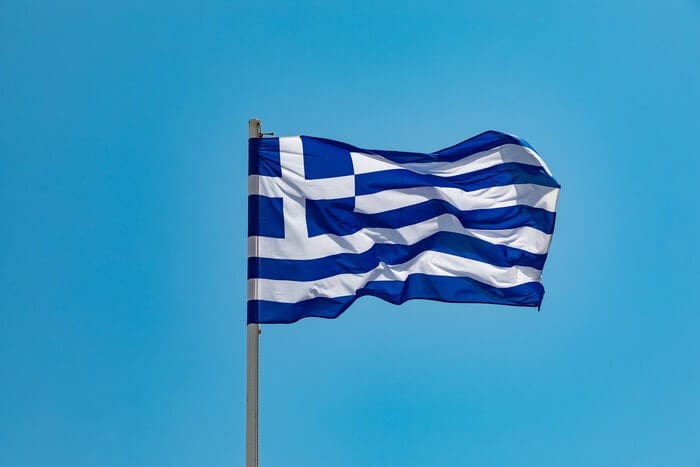
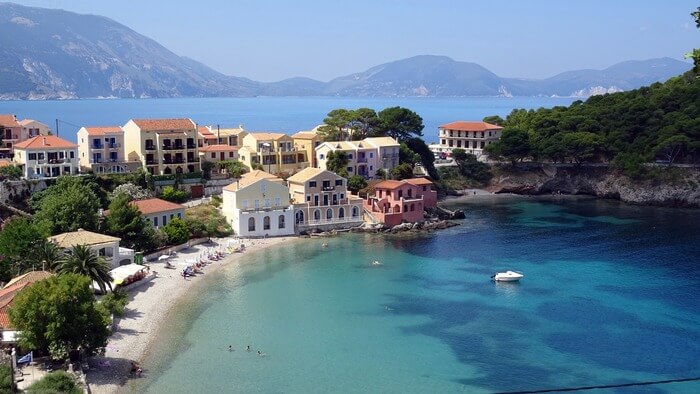


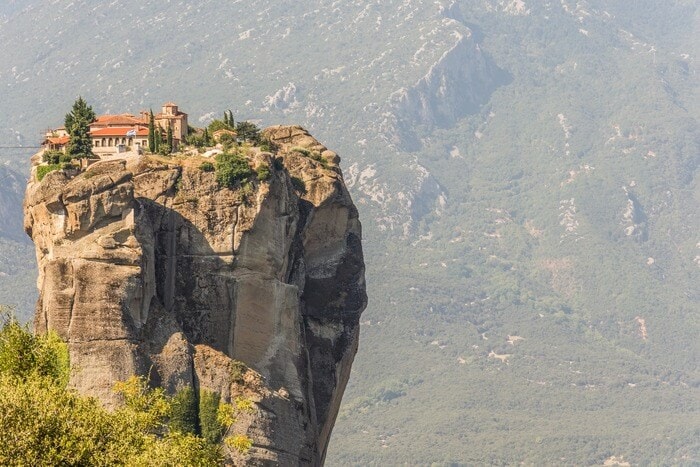
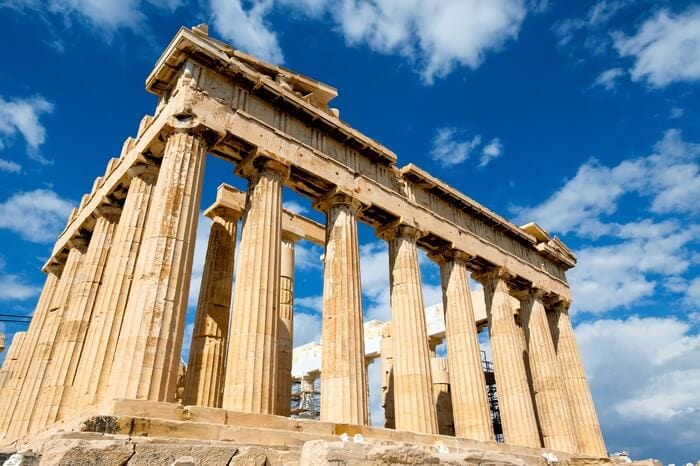
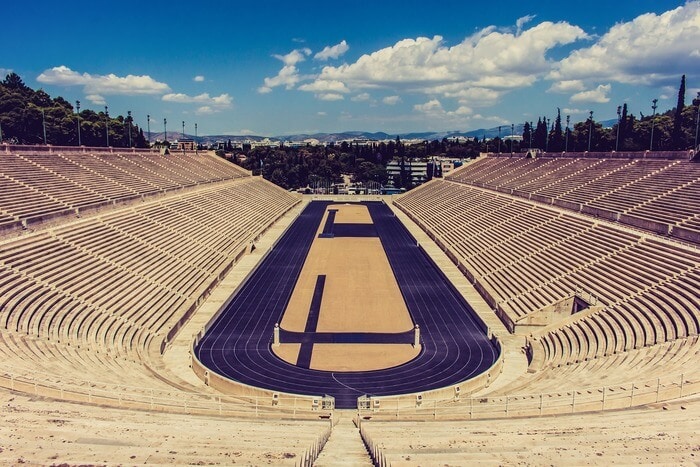
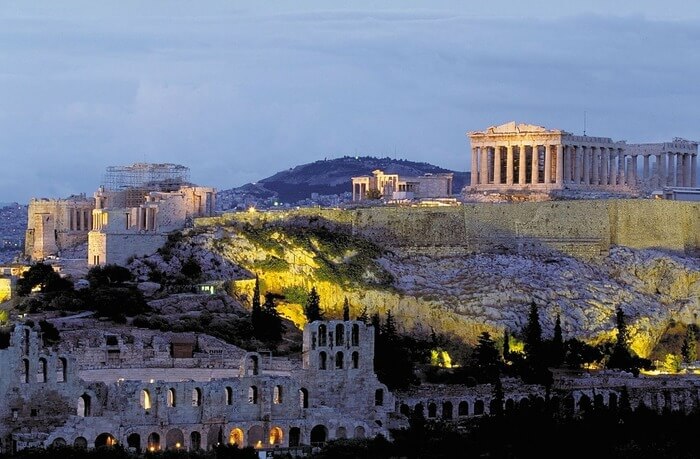

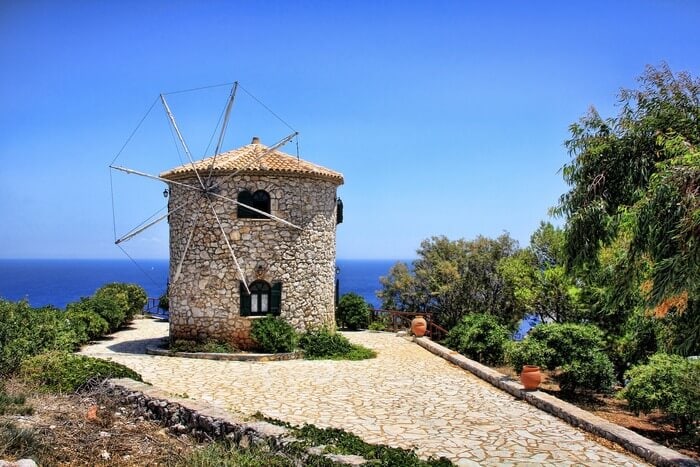
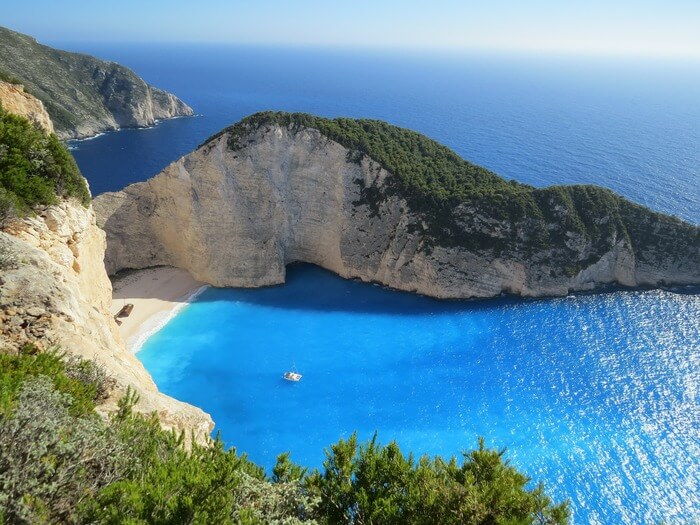
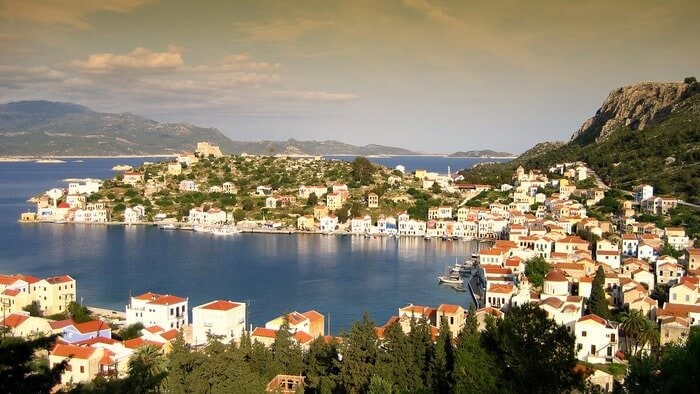
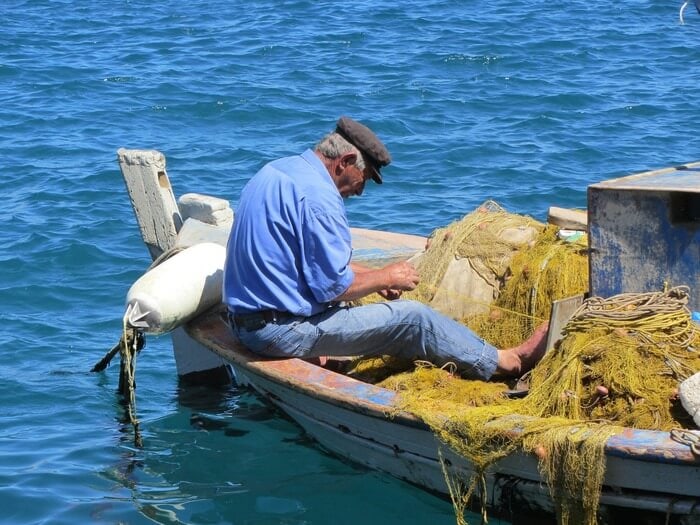
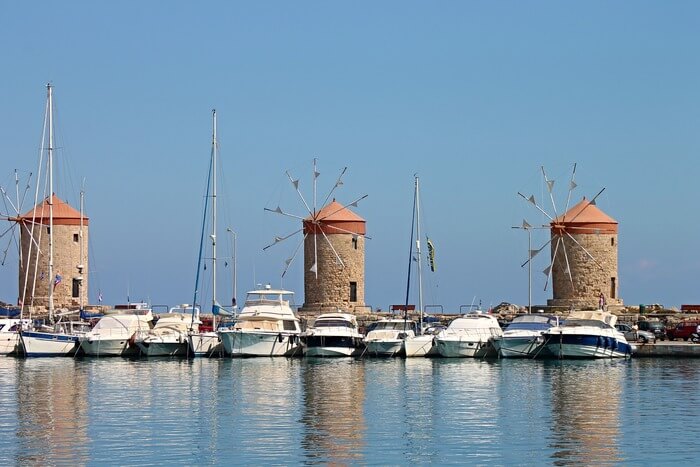
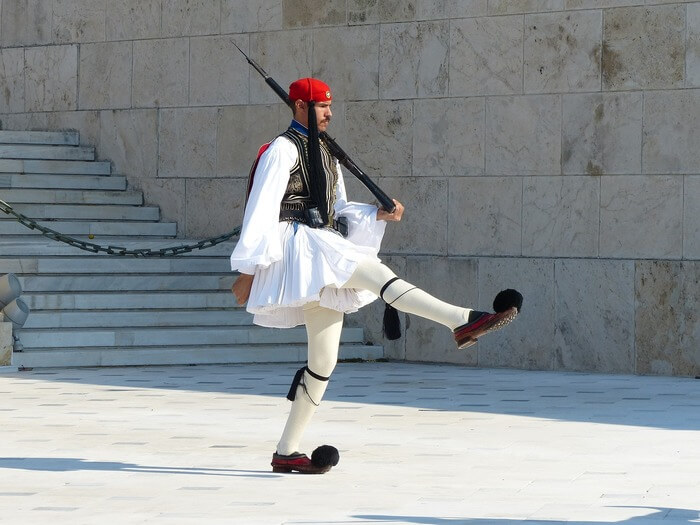

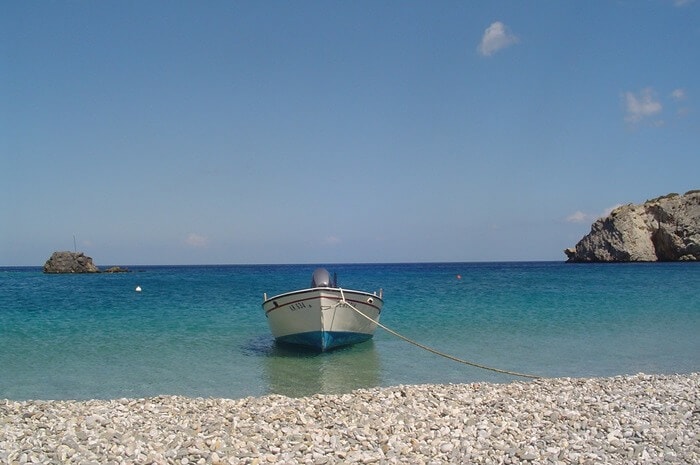
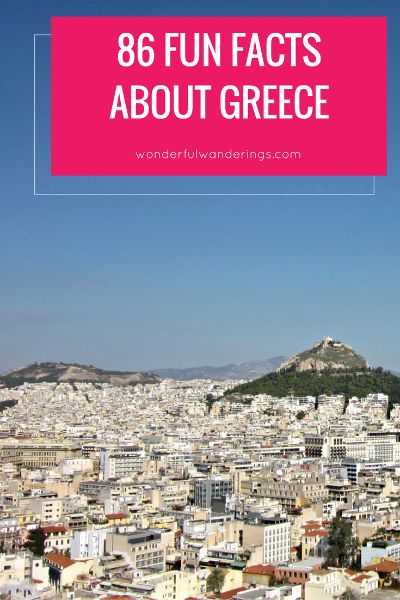
Kapitein Kobe says
Haha, leuke lijst. Krijg spontaan zin om naar Griekenland te vertrekken.
Sofie says
Dankje! Ik hoop later dit jaar het vasteland wat meer te verkennen :-)
amit says
Very Informative. Thanks for sharing
Sofie says
You’re welcome!
joanna says
So interesting. Had me reading for ages until the end! Thank you
Sofie says
My pleasure :-)
Jenny says
We don’t wave with our fists in Greece, we wave like everyone else in the world. The open hand palm gesture is offensive and very different from waving hello. .
Also, no one uses the ok sign in Greece, I bet they will not know what it is, or think you are showing the number zero, instead of being offended.
Btw I am Greek born and raised living in the USA.
Sofie says
Thanks for correcting this!
Tarissa says
Wow! Thank you for sharing! Would love to see another country as well!!
Sofie says
I have a bunch of these facts posts on the blog :) You can use the “search’ in the menu to find them.
Nick says
When we are dancing traditional and we hit our feet’s to the ground is for listening our dead ancestors in Hades that we are still here alive and continuing their legacy.
Sofie says
Thanks so much for sharing this!
Danielle says
hi i’m a fan but can you do Austria next I just need to know!!
Sofie says
I already have one on Austria :) You can find it here.
John says
Number 10 scares me!